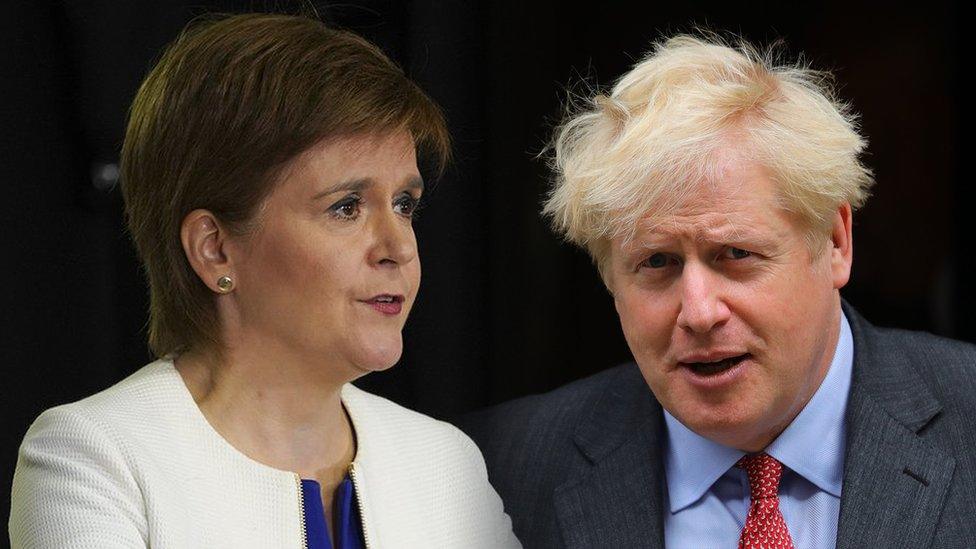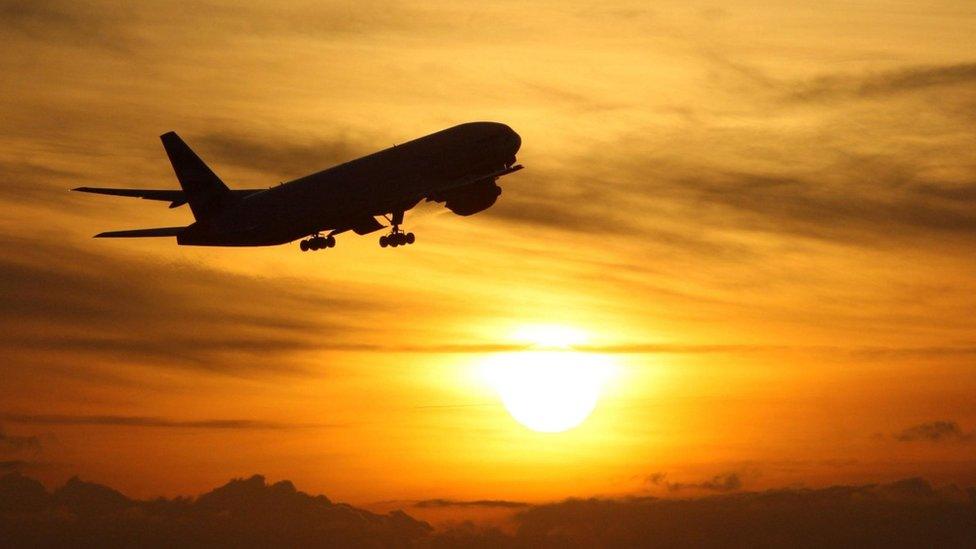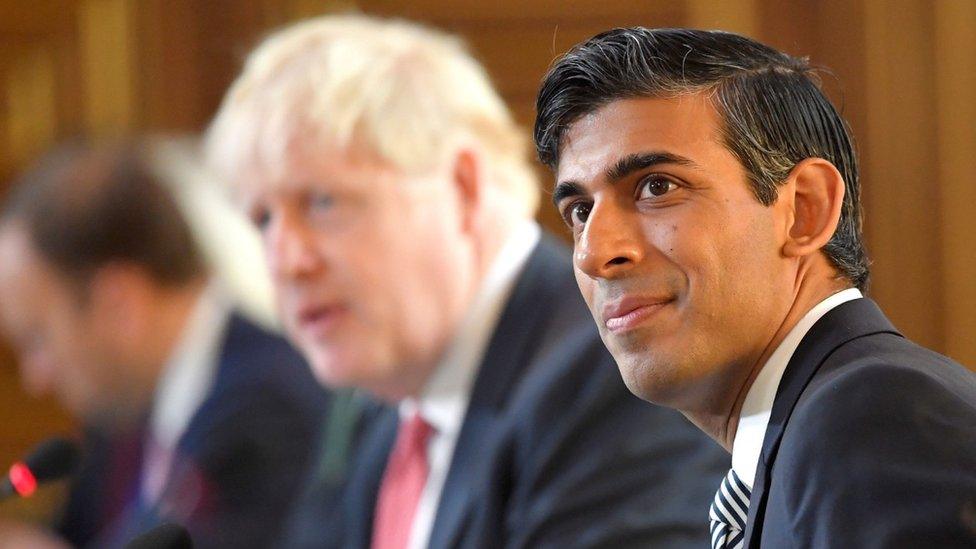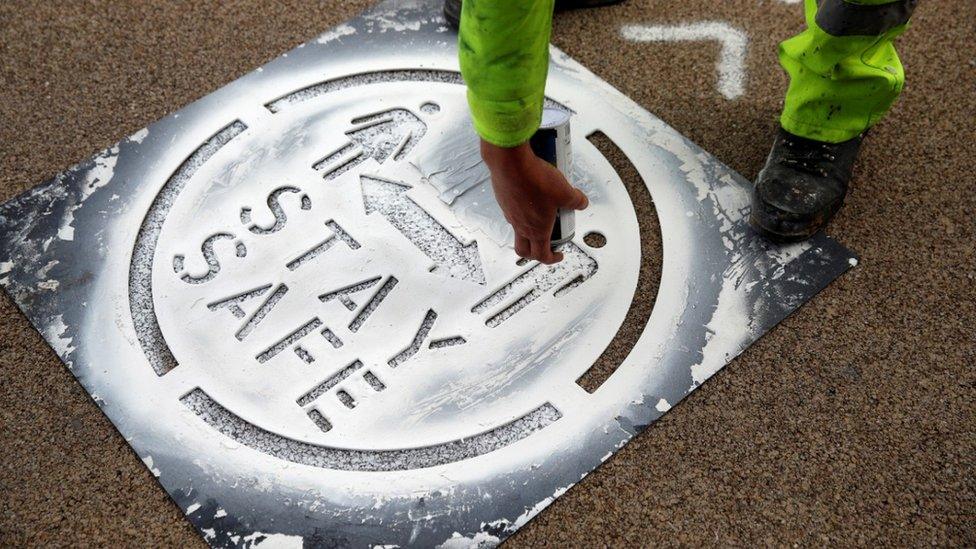Covid in Scotland: Boris's stick and Nicola's carrot
- Published

There's alignment between Downing Street's and Holyrood's approach to tightened infection controls, but also significant differences, including tone and motivation.
While economic constraints are minimised, for now, the sectors worst affected, including pubs and restaurants, are crying out for a renewed surge of support funding, but hearing nothing from the Prime Minister.
Getting the message of risk across to the public carries a risk of further dampening consumer confidence, to go out and spend, and to travel.
The first minister has gone further than the prime minister on restricting household visits. That's a tough message socially, but it's got a low financial cost.
Nicola Sturgeon told MSPs she might have reached a different position on curtailing business activity if she had the borrowing powers to offer different mitigating measures for the economy, businesses and workers.
But without that, and for now, suppression is focusing on social interaction. The tightening of economic constraints are less severe and more closely aligned with UK policy.
That's not to say they are cost-free. Keeping office workers at home will continue to deprive city centres of shoppers, diners and drinkers.
More broadly, consumer confidence won't be helped by the stern warnings of infection risk. The risk message is necessary to keep people alert, but it also dampens the desire to go out and spend.
Performing arts, sports and events are having to reset their expectations of when they can open up again, and it looks a long way off. The Royal Scottish National Orchestra today launched its winter season, and it's entirely digital.
'Catastrophic'
The travel industry was already despairing, but the first minister has never been so blunt on foreign travel: don't do it this October break, she said.
So who is going to risk a winter getaway, with resurgent infections overseas, a bug that likes the cold, and quarantine risk when you get home again? Alpine ski-ing anyone?

The Scottish Passenger Agents Association responded that the FM's comments were "unnecessary, gratuitous and extremely damaging" as it heads towards the end of a "catastrophic" year.
Pubs and restaurants will be hit hard by having less drinking time, as bars lock up no later than 10pm. Those rules will be enforced more rigorously, we're told.
(Scots aged over 60 will recall a standard 10pm closing time meant a rapid swill in the closing half hour, which was not good for health, or the mood on the pavement outside as people had to leave.)
'Arms around people'
But in the near term, the question for business is what support they can expect. While the political pressure is for furlough, the shopping list of tax cuts is getting longer; another year of business rates holiday for retail, leisure, hospitality and tourism: another quarter with VAT bills postponed: help to delay debt repayment: cuts in employers' National Insurance Contributions.
But Boris Johnson has been refusing to say anything specific on the next phase of funding.

Neither Boris Johnson nor Rishi Sunak have made it clear what, if anything, will follow the furlough scheme
Without his Downing Street neighbour, Rishi Sunak, going back to to the money markets to borrow lots more for grants and furlough payments, that makes it hard-to-impossible for many businesses to absorb six more months of losses, or no revenue at all.
Even when the Scottish Tory leader Douglas Ross urged the PM to give more support, Mr Johnson turned to the figures in his briefing on finances already provided to Scotland by the Treasury, along with a general pledge to support people in future. The government will "throw its arms around people".
Flexible furlough
Will that be enough? With pressure rising from business, unions, opposition and increasingly sharp challenges from the PM's own side, attention will focus even more on finding a successor to the furlough scheme.
It has been successful in keeping people out of unemployment, even when there's no work for them to do - but at quite a cost. New figures published by the Treasury on Tuesday show it has cost £39.3bn, up by £4bn in a month.
It has worked also in its more flexible form, with employers able to re-engage workers on a part-time basis, with part-time furlough pay. In its first month, July, there were 367,000 Scots furloughed, and 78,000 of them were on the flexible version.
That came with new UK figures on the Self-Employed Income Support Scheme, which had less success in reaching those in need of help. The first wave, to the end of July, paid out up to £7,500, and cost the Treasury £7.8bn for 2.7m recipients. The second pulse, of reverse tax payments through HMRC, came to £5.6bn, for 2.2m people.
Mind games
Another point where virus suppression meets economics is in psychology. The experts are feeding their judgements to political leaders on which messages work best in persuading people to change their behaviour or simply "dae as their tellt".
That was evident in different messaging from the prime minister than the first minister on how long we should expect these renewed restrictions to be applied. Ms Sturgeon emphasised a three-weekly review. Mr Johnson is softening us up for about six months.

My hunch is that they have the same time-frame in mind. The Scottish approach seems to be to keep people on board and supportive for short periods, which get rolled over, while keeping the public's attention focused.
That assumes six months is too long for many to contemplate and stay supportive - particularly as those six months take us through winter, Christmas and New Year.
Softer tone
The other significant difference in tone, which has been emerging over recent days, is whether to use the carrot or the stick.
Those who see others breaking the rules, and who blame young people for spreading virus, are likely to want to see a punitive response. The British see themselves as having a sense of fair play: if they're to give up their liberties, they really resent those who fail to play by those rules. That approach was most evident from the prime minister today and by others in recent days.
There's a subtle contrast with the message from Holyrood, which takes a softer tone. The toughest talk from Nicola Sturgeon on Tuesday was about enforcing 10pm closure and distancing rules in bars and restaurants. They have licences and face health inspectors, so the stick can be more easily applied.
But for the wider public, the Holyrood carrot is held out as a sense of common endeavour: we owe it to each other, particularly the vulnerable: let's look after one another.
That emphasises solidarity with the majority who obey the rules, rather than highlighting resentment at the minority who do not. We'll find out this winter which approach works better.
